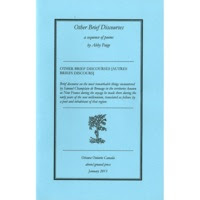Scientia by Jordan Abel
Other Brief Discourses by Abby Paige
Both titles published by above/ground press, 2013.
Last spring I attended a talk on contemporary poetry styles given by rob mclennan and Pearl
Pirie. In my full account of that Ottawa Independent Writers event, I mentioned an instance when some of the group’s most vocal members took
exception to the merits of visual poetry. For the purposes of that review, I referred to the incident as little
more than a hiccup amidst the flow of discourse. In the heat of it, however, that hiccup
persisted for over twenty minutes. Several attendees brashly refused to see
substance in visual poetry while the two guest-speakers defended the form as yet another approach to language and expression.
Keep in mind:
nobody had been close enough to read the text in question. The chapbook hadn’t even left
the guest-speakers’ table. Nevertheless that flash example of chaotic and
non-linear displays resulted in a prolonged back-and-forth, as if unearthing insecurities in the writers’ own private works. That thought-provoking debate
springs to mind when I read Jordan Abel’s Scientia because, aside from the fact
that I’m also a tad intimidated by visual poetry, I think naysayers would gain some
insight via Abel’s sharp approach.
Scientia’s lead
poem reads like a testing of organic matter, the accumulation and reductions
that eventually balance in the creation of life:
“All
colour terms are reduced, cut short, not the usual
length.
Acephalous: without a head. Those muscid ad-
ditions
that give the glandular structure that branching
apex.
Abrupt or hidden. Rubbed or scraped. The third
abductor
extending past the honeycomb of the op-
tic
tract. The tapering surface made white like a siphon.”
As pointed and
sensory as schoolbook directives, Abel’s language unfurls on the adjoining
page, exploring its subject in wide-open parameters without losing the text’s
core meaning. Such is the twofold approach of Scientia, a study of insect anatomy
and miniscule advances that help to shape a greater understanding alongside Abel’s visual accompaniments.
Of these eight poems
fully immersed in the working gears of insect species and their visual re-interpretations
(in which insect outlines blot the swarm of off-shooting words), neither
approach feels the dominant one. Instead they’re co-dependent on a singular
focus that succeeds in drawing the reader to parallel the base
instincts of these complex creatures against our own. With particularly
stunning presentation by above/ground press, Scientia’s findings can behave like
Rorschach tests just as convincingly as they look the part.
Very few
experiences inspire me, both as a writer and overall life-enthusiast, to the
degree that discovering a new city does. Whether I’m grabbing life by the horns
or trying to flee from its expectations, a new city promises that clean slate
the restless crave and the committed can only dream about. Abby Paige’s Other
Brief Discourses, a sequence of poems centered on a trip to Quebec,
instinctively reminds me of the raw drifter muses I’d pore onto pages during countless
Greyhound bus trips.
But Paige finds a
unique lens beyond the escapist reverie: ‘translating’ Samuel Champlain de Brouage’s encounters in New
France “during the early years of the new millennium”. In this fantasy memoir,
the explorer wrestles to integrate himself amidst post-millennial Montreal’s “pox
of pavement”, the outer banks of the Saint Lawrence River and citizens who illustrate
modern life as secular and money-driven (compared to the late 1500s, of course). Excerpt from "VII.
The metro":
“and he
is gone in the earthquake of sound
that
rushes past, sucking air from
the
station like a succubus – and people
in the
belly of the snake! A blur of
faces,
hundreds,
two kissing. The doors gasp
open, we
step over the threshold
and in.
Inside the beast, we swim through the inside
of the
earth as the dead swim, treading soil
like
water, ghosts breathing without gills.”
Although fully
aware he has lost four centuries, Paige’s Champlain rarely engages old-world
wonderment as much as in the above excerpt. In fact many observations feel
symptomatic of a far less lengthy absence; the sprouting big-box outlets in
Montreal, the zoned-out travelers and junkies at the bus station. This
is as much Paige’s poetic retelling as it is a fictional what-if tale and
Other Brief Discourses thrives on the duality of its yearning protagonist(s).
By its very
premise, this sequence of poems is charming. (A poem chronicling Champlain’s
irritation while waiting at the American border keeps springing to mind.) Paige
doesn’t settle for situational, fish-out-of-water commentary though, instead
touching on shades of nostalgia and belonging that gather additional traction for her narrative. From
cramped, urban tunnels and hostel quarters to Champlain’s soiled, waterway haunts;
through the flurry of morning commuters to downtown’s late-night pub-crawls;
Other Brief Discourses strikes a natural ebb and flow that frees the reader
from feeling stuck in one place for too long.



No comments:
Post a Comment